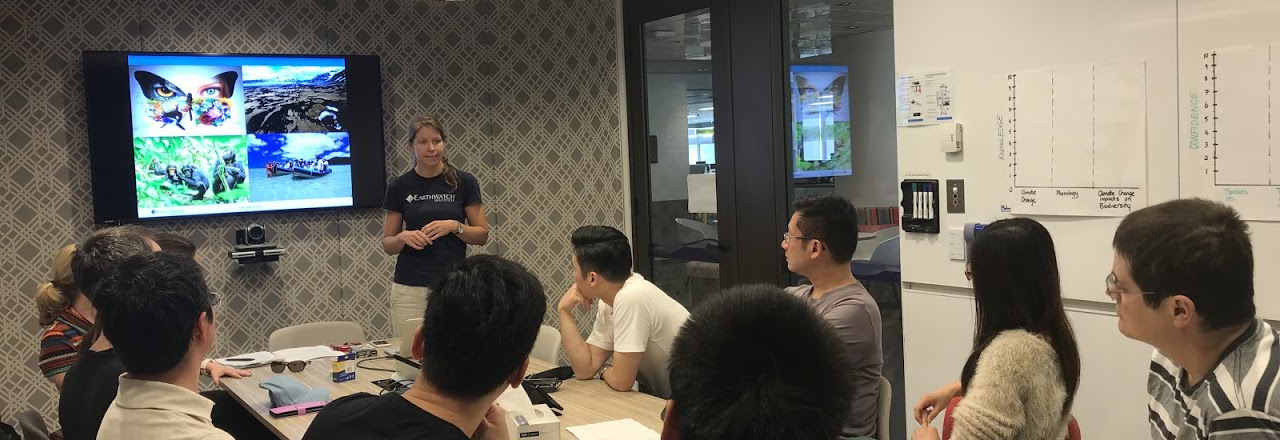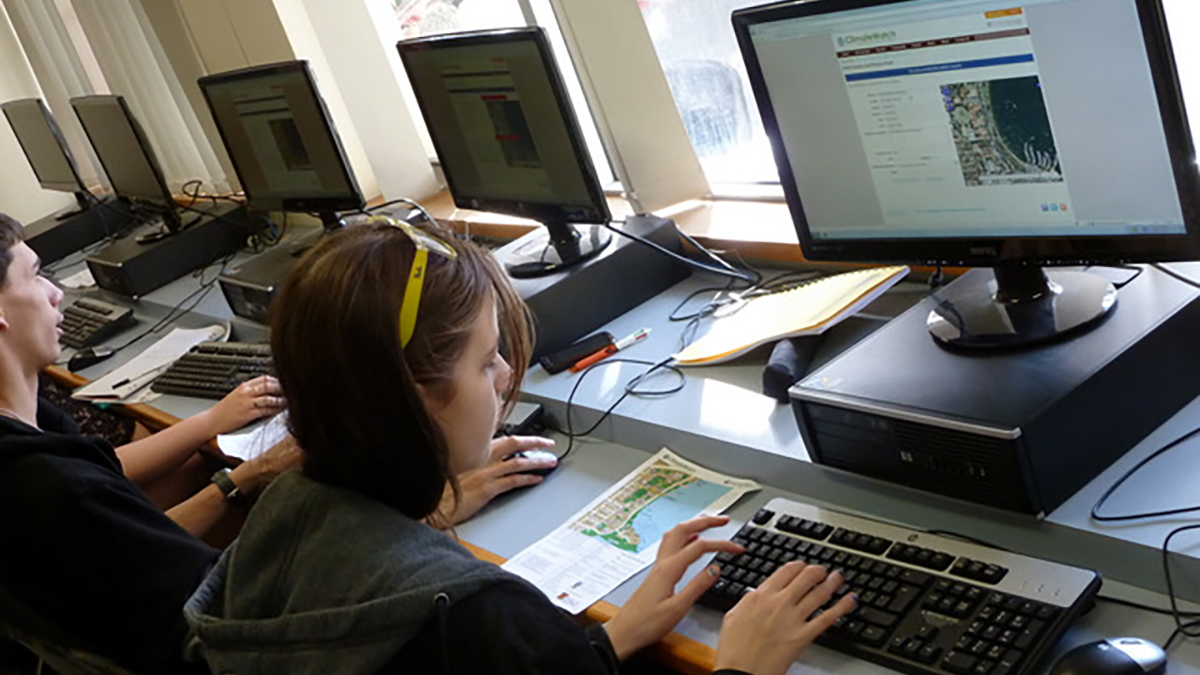Get Involved
Are you concerned about the environment? Do you want to do your bit to preserve our natural heritage for generations to come? Then get involved with ClimateWatch, an active community of citizen scientists making a real difference to the future of our planet.
ClimateWatch is for everyone! You can observe on your own or in groups. For educators, we have lesson plans and activities that align with the national science curriculum. We run workplace volunteering days where you learn about climate science, the impacts of the climate emergency, and changes you can make to live and work sustainably.
You can ClimateWatch anywhere in Australia, even out at sea. There are over 80 ClimateWatch trails across the country.
The data you collect year round helps policy-makers and land managers make informed decisions about climate change mitigation and adaptation plans for Australia's plants and animals. You are contributing directly to climate science and taking climate action by being part of the ClimateWatch community.
Community groups have been an invaluable resource for collecting data over our many trails around Australia. Repeated data collection over the same location gives scientists higher confidence in the validity of the data, meaning it is more likely to be used for climate change research.
If you are a member of a community group, check out our trails page to see if there is a local trail you can get involved in monitoring, or reach out to us at This email address is being protected from spambots. You need JavaScript enabled to view it. to discuss your involvement further.
Other Ways You Can Contribute
Participate in hackathon style events, solve data challenges that benefit nature
Host your own virtual "Data Validation Blitz" using the collateral below
For more than two decades, Earthwatch has worked in partnership with the corporate sector all over the world. ClimateWatch offers employee engagement and professional development opportunities for businesses, whilst supporting scientific research into Australia’s changing climate and other crucial environmental issues.
Join companies like QBE, AMP, Jetstar, and GSA architects in our popular Scientist for a Day program. This program is a team-building and learning day for organisations around climate change, phenology and sustainable living.
Scientist for a Day Program
-
Employees participate in a guided walking tour of a Botanic Gardens nearby, accompanied by Earthwatch scientists and field staff
-
Your team is introduced to climate change and phenology, and receive training on species identification and use of the free ClimateWatch app
-
Through recorded observations, staff actively contribute to ClimateWatch’s database to help scientists understand the impacts of climate change on Australian plants and animals
Digital Volunteer Opportunities
-
Participate in hackathon style events, solve data challenges that benefit nature
-
Host your own virtual "Data Validation Blitz" using the collateral below
Become a ClimateWatch partner
There are a number of benefits to partnering with us:
-
Access to employee engagement and professional development activities such as Scientist for a Day, expeditions and sustainability leadership programs
-
Networking opportunities with other companies, nongovernmental organisations, scientists, and environmental stakeholders
-
Direct support of scientific research focusing on understanding, predicting and mitigating the effects of climate change on Australia’s biodiversity
Contact This email address is being protected from spambots. You need JavaScript enabled to view it. if your business is interested in partnering, volunteering or participating in the Scientist for a Day Program.

Want to get started with monitoring and recording species data for ClimateWatch but don’t know where to start? We have established trails in many botanical gardens throughout some Australian capital cities, which make it easy for you to get started! Many of these gardens offer guided walks that you can follow and record your observations. You can easily record through our ClimateWatch app, or you can download and print off a field guide and recording sheet from our website and then manually enter your data later. Our established botanic garden trails give our scientists a consistent, seasonal and reliable source of species data collection over a significant period of time.
Walking a trail is an easy way to get outside and involve your friends, family, students or colleagues in discovering your local environment while contributing to important research. Trails can be explored for short or long walks, daily or weekly or monthly, it’s up to you. Make sure you wear comfortable walking shoes, a hat and sunscreen, and have some water with you.
Australian National Botanic Garden (ANGB) - ClimateWatch trail
With previous generous funding from Friends of the Gardens, the ClimateWatch trail at the ANBG provides signage for the ClimateWatch plants found around the Gardens, as well as two ClimateWatch information signs. Trained volunteers help record observations of species and engage with visitors to the Gardens to become citizen scientists.
You can head to the ANBG trail page and download the appropriate field species guide, trail sightings and recording sheets to record your observations.
Testimonials
“It is another way that our visitors can engage with our collection of Australian native plants and contribute to valuable research in protecting our native plant species.”
ANBG General Manager, Peter Byron, 2010
Other Ways you Can Contribute
Participate in hackathon style events, solve data challenges that benefit nature
Host your own virtual "Data Validation Blitz" using the collateral below
Has using the ClimateWatch program got you inspired to do more for climate change? We’ve outlined some easy ideas below of how you can get started in living more sustainably everyday, from recycling and volunteering to changing your diet and lessening your carbon footprint.
ClimateWatch is an authentic learning experience that can be incorporated into primary, secondary and tertiary school subjects, backyard or school ground explorations, field excursions or camps. Taking part in citizen science that monitors and records plant and animal behaviour is naturally aligned to the Science stream of the Australian curriculum. ClimateWatch is also a great way to build student capacity in critical and creative thinking, numeracy and ITC skills.
ClimateWatch provides real-world learning opportunities for university students, from data collection out in the field to data analysis and interpretation back in the classroom. By actually making science, not just reading about it, students are engaged and motivated to learn, and feel like they’re making a difference by contributing to Australia’s climate change response.
Tertiary education institutions across the country have been integrating ClimateWatch into their courses and seven Australian universities now have a ClimateWatch trail located on campus. The trails have been developed in collaboration with university teaching staff, grounds staff and local conservation groups who helped select key locations and shortlist ClimateWatch indicator species.
Through delivery partnerships with Australian universities, ClimateWatch is engaging the next generation of scientists, science communicators and computer scientists in projects that make a difference and build Australia’s citizen science capacity. The success of ClimateWatch delivery partnerships relies on creating value for the partner. For example ClimateWatch can involve students from fields as diverse as biology, science communication and computer science through activities like data collection and analysis by science students, representing results can involve software development projects for computer science students and sharing results with non-experts can provide projects for students in science communication.
Digital Volunteer Opportunities
- Participate in hackathon style events, solve data challenges that benefit nature
- Host your own virtual "Data Validation Blitz" using ClimateWatch's community validation feature and the collateral below
Helpful Resources

Case Study | University of Western Australia (UWA)
As part of their course, first-year biology students utilise ClimateWatch records on a chosen species to formulate a hypothesis as to why that species might show different phenophases over time. They are required to submit their own observations, made easy through the dedicated ClimateWatch trail on campus.
Students learn the complete process of scientific research in a fun and engaging way, with research showing the majority planned to continue recording data for ClimateWatch after the project was finished. A large proportion (35 percent) also introduced the application to their friends, demonstrating the important role ClimateWatch has in environmental engagement.
ClimateWatch has been integrating into the biology courses at UWA to help open the eyes of students to what plants and animals are doing at different times of the year, and to demonstrate how this information could be used to better understand the effects of climate change on our biota. It is also contributing to building datasets in Western Australia and first year university students are perfectly positioned to make an important contribution.
This program provides a great opportunity that early year students don't often get to do something that contributes to genuine research. The focus on indicator species introduces students to data gathering with common species such as Willie Wagtails that are frequently seen. Students can practise their observation skills and increase their understanding of animal behaviour in a cumulative fashion. The more they observe, the more they learn, and the more they want to understand about individual species and the impacts that climate change may be having on them.
